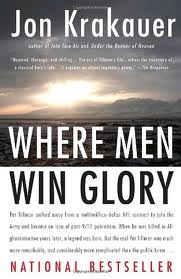 I waited a long time for Jon Krakauer’s book about Pat Tillman, “Where Men Win Glory,” to appear in paperback. My interest wasn’t so much Tillman as it was Krakauer, a tremendous writer whose “Into Thin Air” is among the best nonfiction books I’ve read. I knew that Krakauer would cover the story of Pat Tillman–a story shrouded in confusion–in a compelling, thorough way. And he did.
I waited a long time for Jon Krakauer’s book about Pat Tillman, “Where Men Win Glory,” to appear in paperback. My interest wasn’t so much Tillman as it was Krakauer, a tremendous writer whose “Into Thin Air” is among the best nonfiction books I’ve read. I knew that Krakauer would cover the story of Pat Tillman–a story shrouded in confusion–in a compelling, thorough way. And he did.
Pat Tillman, an NFL safety for the Arizona Cardinals, put his career on hold to enlist, for three years, in the Army Rangers. This happened a few months after 9/11, and was highly trumpeted in the press. Tillman never spoke to the press about his decision, but he did keep journals of his experiences. Many excerpts appear in this book.
The first part of “Where Men Win Glory” traces Tillman’s formative years. We see him as a youngster. We see his football heroics in high school. We follow him to Arizona State, and then on to the NFL. Throughout this, Krakauer jumps back and forth between Tillman’s life in California and Arizona, and Afghanistan, showing what was happening concurrently in that country–the Soviet occupation, the growing influence of Osama bin Laden, the Soviet withdrawal, years of civil war, the rise of the Taliban. It gives fascinating perspective.
Pat Tillman, the book shows, was an absolutely unique guy who followed his own drumbeat. He constantly challenged himself physically; twice, while hiking in Arizona, he jumped off a cliff into the upper branches of a Ponderosa pine. Though a man’s man, he showed a tenderness toward others. At ASU, he would cry over missing his family and his high school sweetheart, Marie (whom he married shortly before entering the military).
Pat’s brother Kevin, then playing semi-pro baseball, enlisted with Pat. Throughout their military service, they were together–all the way to Pat’s death. They were as close as any brothers can be, and very much alike. Being such nonconformists, it was interesting to observe how they coped with highly-regimented military life. A system based on seniority, not merit, grated on Tillman.
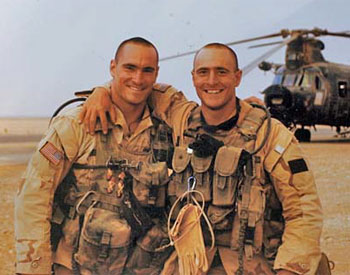 Pat (left) and Kevin Tillman.
Pat (left) and Kevin Tillman.As the book shows, Tillman’s military service was not a good experience. He enlisted in hopes of battling the terrorists who caused 9/11. Instead, he soon found himself in Iraq, a war he personally opposed. Even then, he and his fellow Rangers didn’t see action, but largely sat on the sidelines.
After that initial tour, the Tillmans returned to the States, where they aced Ranger School. Then they were sent to Afghanistan, a war Pat Tillman did believe in, and where he had hoped to go all along.
However, even Afghanistan was a disappointment, devoid of action. Pat had, by then, decided that in another year, after his three-year enlistment ended, he would return to football. The military frustrated him.
In April 2004, Pat Tillman died at the hands of fellow Rangers. Against all military wisdom, orders came to divide the Ranger patrol, all in an effort to salvage a broken Humvee. A few Taliban lobbed some mortar shells and fired their AKs, but from then on, it was basically one group of out-of-control Rangers firing at the other group. Krakauer describes everything in great detail. Tillman is shot three times in the head with a Squad Automatic Weapon (SAW).
Earlier in the book, during the Iraq section, Krakauer devotes a lot of time to the Jessica Lynch affair. Her supply convoy stumbles into an ambush, and she, badly injured in a vehicle crash, is taken prisoner. She did nothing heroic. In addition, in the aftermath of the ambush, another 17 American soldiers were accidentally killed by friendly fire from A-10 Warthogs, which made repeated bombing and strafing runs on American troops. It was a total mess.
The White House had created a special Office of Global Communications to manipulate public opinion about the lead-up to the Iraq War, and then to engage in “strategic deception” to shape public opinion in favor of the war once it started. A guy named James Wilkinson, a protege of Karl Rove, was put in charge.
 When Jessica Lynch was captured, Wilkinson made up the story–which I clearly remember hearing–about how Lynch courageously held off attacking Iraqis with her M-16 until she was eventually shot and bayoneted. Nothing like this happened. This was followed by an extensive cover-up of the friendly fire deaths, which didn’t become publicly known for many years.
When Jessica Lynch was captured, Wilkinson made up the story–which I clearly remember hearing–about how Lynch courageously held off attacking Iraqis with her M-16 until she was eventually shot and bayoneted. Nothing like this happened. This was followed by an extensive cover-up of the friendly fire deaths, which didn’t become publicly known for many years.
Krakauer told this story as a prelude to the outrageous cover-up following Pat Tillman’s death. The military released a story, told at Tillman’s funeral, about how he died heroically while leading fellow Rangers in charging up a hill at ambushers. General William McChrystal was totally complicit in this. Military protocol says that deceased soldiers are to be shipped back to the States with their uniforms, body armor, and helmets, all of which are considered forensic evidence. But Tillman was sent back naked; orders came down to burn his uniform in Afghanistan. The soldier who carried this out said his orders also involved burning Tillman’s final journal.
McChrystal drew up a Silver Star citation without talking to any eyewitnesses, falsifying information and never revealing to the review board the crucial information that Tillman was killed by friendly fire–a fact which everyone involved knew. Tillman died while hiding behind a hillside rock with another soldier (who survived), avoiding furious machine-gun fire from Rangers down below. But the military needed a combat hero, so they created one. The Iraq war was going badly; the first battle of Fallujah had just ended, and the Abu Graib mess had just broken. The Tillman story provided a distraction.
Numerous military protocols were broken, intentionally. A series of investigations were thwarted. The only persons penalized were low-level Rangers, not the officers complicit in the cover-up and deception (two of whom were soon promoted). The extent of the deception is breath-taking.
Krakauer describes everything in great detail, and it’s maddening. Pat Tillman enlisted to serve his country, and then his country hijacked his virtue and his legacy. And as Kevin Tillman notes, only the fact that Pat Tillman was well-known, coupled with the tenacity of the close-knit Tillman family in pursuing the truth, enabled the facts to come to light. If it had been any other soldier, the cover-up would have succeeded, and the truth would have been buried forever.
This isn’t the book I was expecting to read. But it was truly an amazing, hard-to-put-down book. And I’ll carry with me, for a long time, the uniqueness that was Pat Tillman. I encourage you to read the book if only to learn about this guy who continually challenged himself, did his own thinking, followed his convictions, was wildly devoted to his wife and family, and truly cared about other people.
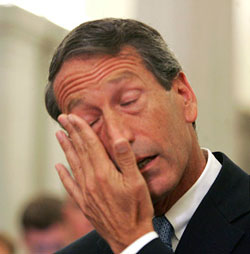


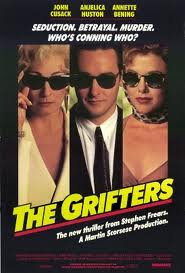 “The Grifters” is a 1963 book by Jim Thompson (published by Vintage/Black Lizard in 1990). It focuses on smalltime con-artist Roy Dillon, along with his girlfriend Myra Langtry and mother, Lilly Dillon, who are also con artists. There are no “good guys.” Everyone’s a crook.
“The Grifters” is a 1963 book by Jim Thompson (published by Vintage/Black Lizard in 1990). It focuses on smalltime con-artist Roy Dillon, along with his girlfriend Myra Langtry and mother, Lilly Dillon, who are also con artists. There are no “good guys.” Everyone’s a crook.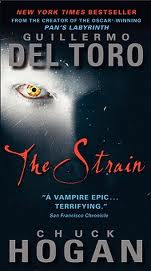 “The Strain” is a 600-page collaboration between Chuck Hogan and film director Guillermo del Toro, published in 2009. It’s the first in a trilogy. Since del Toro is a big movie director (“Pan’s Labyrinth,” “Hellboy”), I wonder if they envision a movie trilogy? If so, they need to make it more interesting.
“The Strain” is a 600-page collaboration between Chuck Hogan and film director Guillermo del Toro, published in 2009. It’s the first in a trilogy. Since del Toro is a big movie director (“Pan’s Labyrinth,” “Hellboy”), I wonder if they envision a movie trilogy? If so, they need to make it more interesting. 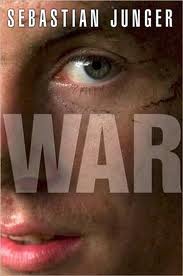 I’ve been reading quite a few books about the Iraq and Afghanistan wars. Most have been very good, and they’ve all been quite different.
I’ve been reading quite a few books about the Iraq and Afghanistan wars. Most have been very good, and they’ve all been quite different.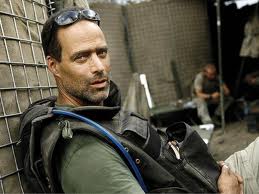 One soldier told him, “There are guys in the platoon who straight up hate each other. But they would also die for each other.”
One soldier told him, “There are guys in the platoon who straight up hate each other. But they would also die for each other.”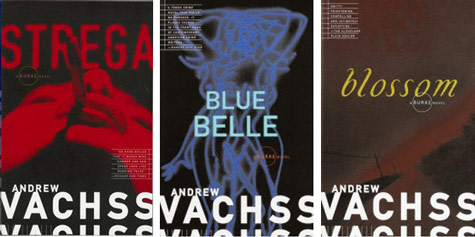
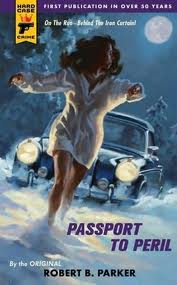 You may be surprised that Robert B. Parker wrote “Passport to Peril” in 1951. That’s because we’re not talking about the Parker of Spenser and Jesse Stone fame, but of Robert Bogardus Parker, who wrote three books before dying in 1955 at age 49.
You may be surprised that Robert B. Parker wrote “Passport to Peril” in 1951. That’s because we’re not talking about the Parker of Spenser and Jesse Stone fame, but of Robert Bogardus Parker, who wrote three books before dying in 1955 at age 49.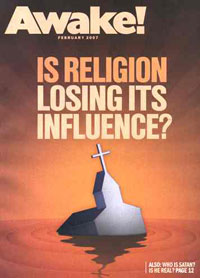 I was at a BP station buying two large cappuccinos–french vanilla for Pam, a caramel for me. A young black gal wearing a dress, very pretty, came up beside me and stood there for a few second.
I was at a BP station buying two large cappuccinos–french vanilla for Pam, a caramel for me. A young black gal wearing a dress, very pretty, came up beside me and stood there for a few second.  I waited a long time for Jon Krakauer’s book about Pat Tillman, “Where Men Win Glory,” to appear in paperback. My interest wasn’t so much Tillman as it was Krakauer, a tremendous writer whose “Into Thin Air” is among the best nonfiction books I’ve read. I knew that Krakauer would cover the story of Pat Tillman–a story shrouded in confusion–in a compelling, thorough way. And he did.
I waited a long time for Jon Krakauer’s book about Pat Tillman, “Where Men Win Glory,” to appear in paperback. My interest wasn’t so much Tillman as it was Krakauer, a tremendous writer whose “Into Thin Air” is among the best nonfiction books I’ve read. I knew that Krakauer would cover the story of Pat Tillman–a story shrouded in confusion–in a compelling, thorough way. And he did.




